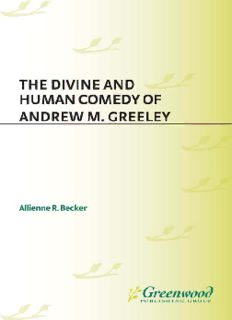
The Divine and Human Comedy of Andrew M. Greeley (Contributions to the Study of American Literature) PDF
Preview The Divine and Human Comedy of Andrew M. Greeley (Contributions to the Study of American Literature)
The Divine and Human Comedy of Andrew ML Greeley Recent Titles in Contributions to the Study of American Literature The Short Fiction of Kurt Vonnegut Peter J. Reed Enchanted Places: The Use of Setting in F. Scott Fitzgerald's Fiction Aiping Zhang Solitude and Society in the Works of Herman Melville and Edith Wharton Linda Costanzo Cahir The Immigrant Experience in North American Literature: Carving out a Niche Katherine B. Payant and Toby Rose, editors American Literary Humor During the Great Depression Robert A. Gates The Marriage of Heaven and Earth: Alchemical Regeneration in the Works of Taylor, Poe, Hawthorne, and Fuller Randall A. Clack The Divine and Human Comedy of Andrew ML Greeley Allienne R. Becker Foreword by Andrew M. Greeley Contributions to the Study of American Literature, Number 7 GREENWOOD PRESS Westport, Connecticut • London Library of Congress Cataloging-in-Publication Data Becker, AllienneR. The divine and human comedy of Andrew M. Greeley /by Allienne R. Becker; foreword by Andrew M. Greeley. p. cm.—(Contributions to the study of American literature, ISSN 1092-6356 ; no. 7) Includes bibliographical references and index. ISBN 0-313-31564-7 (alk. paper) 1. Greeley, Andrew M., 1928 Criticism and interpretation. 2. Balzac, Honora de, 1799-1850—Influence. 3. Catholic Church—In literature. 4. Catholics in literature. 5. Christian fiction, American—History and criticism. 6. Christianity and literature—United States—History—20th century. I. Title. II. Series PS3557.R358Z55 2000 813'.54—dc21 00-025114 British Library Cataloguing in Publication Data is available. Copyright © 2000 by Allienne R. Becker All rights reserved. No portion of this book may be reproduced, by any process or technique, without the express written consent of the publisher. Library of Congress Catalog Card Number: 00-25114 ISBN: 0-313-31564-7 ISSN: 1092-6356 First published in 2000 Greenwood Press, 88 Post Road West, Westport, CT 06881 An imprint of Greenwood Publishing Group, Inc. www.greenwood.com Printed in the United States of America The paper used in this book complies with the Permanent Paper Standard issued by the National Information Standards Organization (Z39.48-1984). 10 9 8 7 6 5 4 3 21 To Isidore H. Becker—my husband, my proofreader, and my best friend This page intentionally left blank Contents Foreword by Andrew M. Greeley ix 1. Introduction 1 2. The Quest for the Holy Grail 19 3. Rumors of Angels 35 4. The Passover Trilogy 61 5. Time between the Stars 77 6. God Game and the Angel Trilogy 133 7. White Smoke 157 8. Star Bright! and Other Short Fiction 165 9. The O'Malley Saga 171 10. L'Envoi 179 Selected Bibliography 183 Index 187 This page intentionally left blank Foreword An author approaches literary criticism of his work with a certain unease. He understands that (classic) criticism involves reading a book, understanding it, and interpreting it. Will the critic really read what the author has said? Will he understand it? How will she interpret it? If said author is then asked to write a foreword to the critic's book, he must say whether he thinks the critic has read his work generously and understood it sympathetically. Then he must address the question of whether the critic's interpretation seems valid—or to be more precise whether it does not seem invalid. It is easy for me to say that Professor Becker has been both generous and sympathetic. I believe that anyone who buys a book or at least reads one some one else bought has the right to have an opinion. (Those who have opinions without reading the work are to be dismissed without further consideration.) Often it has seemed to me that some readers are neither generous nor sympa thetic because they begin their reading with preconceived notions. That is their privilege. I much prefer, however, critics who are willing to give me the benefit of the doubt, who are willing to dialogue with my work with open minds and even open hearts. As to the issue of interpretation, I find surprise in Professor Becker's inter pretations, but not invalidity. I was not aware when I was writing of many of the themes she discusses—rarely I suspect is an author aware of such matters, so taken up is he (or she) with the telling of the story. But I cannot deny that the themes are there. Perhaps they were lurking in the far reaches (or, to change the metaphor, in the dark subbasements) of my preconscious as I tried to get down on computer screen what the characters were doing and saying. But what about Professor Becker's Honore de Balzac's model? At first I admit that I was astonished. I knew he was a famous French novelist, but I had never read him. After I read Professor Becker's first essay, I began, naturally
Description: